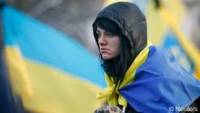Linguistically United: Lviv and Donetsk

As a mark of linguistic solidarity between East and West, a number of people in Lviv and Donetsk switched languages on Feb. 26. While in Lviv, Wednesday it was decided that people would only speak Russian, in Donetsk, on the contrary, people who joined the flashmob initiative, spoke only Ukrainian.
The activists were demonstrating in this manner that the linguistic divisions in the country are being artificially hyped up and that there is no pressure against Russian or Ukrainian speakers.
Radio Svoboda writes that the Donetsk initiative, started by young people, brought a surprise with officials in the city council speaking Ukrainian. The action in Donetsk was aimed at stressing that many young people in Donetsk know Ukrainian, don’t have trouble speaking it, and don’t have any negative feelings about the language.
Darya Kurenna, who normally speaks Ukrainian only at home, encouraged her friends to take part in the flash mob which she believes is a positive step for Donetsk helping to break down stereotypes about language.
Serhiy Tkachenko, head of the Donetsk regional branch of the Committee of Voters of Ukraine [CVU] believes such actions are extremely well-timed and stresses the importance of all moves aimed at seeking to unite different regions of the country.
He adds that its vital that such actions get supported by wider parts of the public and are not seen as some kind of trick from political parties.
In Lviv, where the initiative was born, people wrote on social networks that if people agreed that Lviv was not a city of Nazis (as is often claimed by people from the communist party and Party of the Regions), they were invited to take part in a whole day of speaking only Ukrainian.
One of the first moves taken by Ukraine’s new leaders at the weekend was to cancel the highly contentious language policy law. This was tabled in parliament by Party of the Regions MPs Kivalov and Kolesnichenko in June 2012 and was passed, then signed into law by Viktor Yanukovych despite mass protest, as well as criticism from a large number of Ukrainian NGOs, churches, the OSCE and other international structures. The law effectively bypassed the Constitution and significantly heightened the role of the Russian language in regions where more than 10% considered Russian their first language.
The law is undoubtedly unconstitutional, however it’s cancellation at a time when eastern and southern regions of the country were already worried about the changes in leadership was probably precipitous. Language differences have been used in Ukraine by certain political parties for their own ends, most of which seem to involve sharpening tension and distrust. This is further exacerbated by Russian statements from the Kremlin and intensive propaganda in the media.





